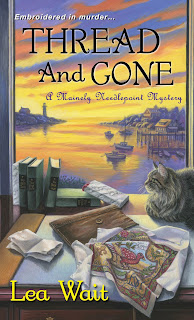Today we’re happy to have back Maine author Lea Wait who writes
the Mainely Needlepoint Mysteries and the Shadows Antique Print Mysteries, as
well as nineteenth century Maine-set historical novels for young people. Learn
more about Lea and her books at her website.
American
School Girl Samplers
“Take your needle, my
child, and work at your pattern; it will come out a rose by and by. Life is
like that – one stitch taken patiently and the pattern will come out all right,
like embroidery.”-- Oliver Wendell Holmes (1809-1894) from The Autocrat of the Breakfast-Table
A number of readers
of my Mainely Needlepoint mystery series have asked me about the quotations I
put at the beginning of each chapter. Some, like the one above, are from books
printed in the nineteenth century or before, but most are moral verses embroidered
by American girls as young as six on samplers stitched in the late eighteenth
and early nineteenth centuries.
Samplers made during
this period usually included several alphabets (in different stitches,) and
numbers, a verse, a (usually floral) border, and perhaps a scene, or a family
tree. They were works of art often preserved by the young woman or by her
parents. Although most girls were taught sewing and embroidery skills by their
families, the larger, more elaborate samplers seen today in museums and private
collections were often designed by skilled teachers and taught to girls as part
of their education in private schools in the mid-Atlantic and New England
states. Populations in other areas were sparse at that time, and girls living
there didn’t have the luxury of time to create what were really works of art.
Samplers from states
outside Ohio, Pennsylvania, Washington.D.C., Maryland, Delaware and the New
England states are today especially valued by collectors because far fewer of
them have survived.
Verses found on
samplers may be from hymns, from songs of the period, from poems, or from
religious texts. Primers, whose reading exercises were often moral lessons,
were also a source of verses for many girls. And because of the high mortality
rates of the period, verses about death were common.
For example:
“Beauty
and virtue, when they do meet,
With
a good education make a lady complete.”
(1774 sampler)
Or:
“This
work in hand my friends may have
When
I am dead and in my grave
And
which when’er you chance to see
May
kind remembrance picture me
While
on this glowing canvas stands
The
Labour of my youthful hands.” (1752 sampler)
Perfect epilogues for
a mystery series!
(If you’re interested
in more information about the history of schoolgirl samplers and needlepoint, Lea
has compiled a bibliography of sources. There’s a link to it on the home page
of her website.)
Thread and Gone
When a priceless antique is stolen, murder unravels the
peaceful seaside town of Haven Harbor, Maine. . .
Angie Curtis and her fellow Mainely Needlepointers know
how to enjoy their holidays. But nothing grabs their attention like tying up
loose threads. So when Mary Clough drops in on the group's Fourth of July
supper with a question about an antique needlepoint she's discovered in her
family attic, Angie and her ravelers are happy to look into the matter.
Angie's best guess is that the mystery piece may have been
stitched by Mary, Queen of Scots, famous not just for losing her head, but also
for her needlepointing. If Angie's right, the piece would be extremely
valuable. For safekeeping, Angie turns the piece over to her family lawyer, who
places it in a safe in her office. But when the lawyer is found dead with the
safe open and ransacked, the real mystery begins. . .
Buy Links




4 comments:
I'm amazed that someone had the patience to sit and for so long and create something so lovely. Thanks for the post.
What a great idea for a mystery. The samplers are so worth preserving.
Fascinating. I somehow got the idea that samplers were literally samples of different stitches that a student was learning. Sounds like they were an end unto themselves. Thanks for the info!
An intriguing mystery wrapped in history. That is something I'll have to check out. Thanks for the short lesson on those needlepoints we see but many of us know little about.
Post a Comment